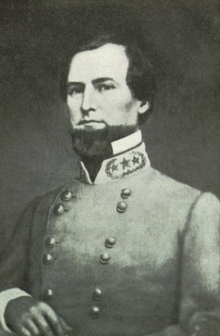Lawrence O'Bryan Branch
| Lawrence O'Bryan Branch | |
|---|---|
 | |
| Born |
November 28, 1820 Enfield, North Carolina |
| Died |
September 17, 1862 (age 41) Sharpsburg, Maryland |
| Allegiance |
|
| Service/branch |
|
| Years of service | 1861–62 |
| Rank |
|
| Battles/wars | |
| Spouse(s) | Nancy Haywood Blount |
| Other work | U.S. Congressman |

Lawrence O'Bryan Branch (November 28, 1820 – September 17, 1862) was a North Carolina representative in the U.S. Congress and a Confederate brigadier general in the American Civil War, killed at the Battle of Antietam.
Early life and career
Branch was born in Enfield, Halifax County, North Carolina to Major Joseph Branch and Susan Simpson O'Bryan Branch. His family moved to Williamson County, Tennessee but his mother died when he was five and his father died in 1827. His uncle, Secretary of the Navy John Branch (then serving as Governor of North Carolina) assumed his guardianship and took him back to North Carolina. Branch moved to Washington City with his uncle when the latter took the position as Secretary of the Navy and he was tutored by Salmon P. Chase. He pursued a preparatory course under a private teacher in Washington, D.C., before going on to train at North Carolina's Bingham Military Academy. He also attended the University of North Carolina at Chapel Hill for a short time and, in 1838, graduated first in his class from Princeton College before going to study law in Nashville, Tennessee, where he also owned and edited a newspaper.
In 1840, Branch moved to Tallahassee, Florida and was admitted to the bar to practice law by a special act of the legislature. Just one year later, he went to fight in the Seminole Wars. In 1844, he married Nancy Haywood Blount and they had four children. In 1852, he moved to Raleigh, North Carolina, where he continued to practice law and became president of the Raleigh & Gaston Railroad Co. He also served as an elector on the Franklin Pierce ticket in 1852. Branch was elected as a Democrat to the 34th, 35th, and 36th Congresses (March 4, 1855, to March 3, 1861) but was not a candidate for renomination in 1860. On December 2, 1860, he was appointed, (but declined), the position of Secretary of the Treasury by President James Buchanan.
Civil War
Branch entered the Confederate Army, in May 1861, as a private in the Raleigh Rifles. Later that month he accepted the office of State quartermaster general, but resigned it for service in the field, and in September he was elected colonel (United States) of the 33rd North Carolina. He was appointed brigadier general in January 1862. After the Battle of New Bern his brigade was attached to A.P. Hill's Division, Stonewall Jackson's Corps. He was the senior brigadier general in Hill's division. Branch's brigade fought at the Battle of Hanover Courthouse, the Seven Days Battles, Cedar Mountain, Second Manassas, the Chantilly, and Harper's Ferry
Antietam
On September 17, 1862, he led his troops on a rapid march from Harpers Ferry to Sharpsburg, Maryland where the Battle of Antietam was raging. Branch arrived on the field around 2:30 PM, in time to help stop the Union advance, thus saving General Robert E. Lee's right flank from a crushing defeat. Soon after this victory, Branch stood talking with fellow brigadier generals Maxcy Gregg, Dorsey Pender, James J. Archer, along with Hill and General Lee when a Federal sharpshooter, seeing the group, fired a shot that hit him in the right cheek and exited behind his left ear, killing him instantly. He fell dead into the arms of a staff officer.
Dates of Rank
- Private, May 1, 1861
- Colonel, September 1, 1861
- Brigadier General, January 16, 1862
Memorials
Branch had won the respect of his fellow officers and after his death Hill said of him, "He was my senior brigadier and one to whom I could have entrusted the command of the division with all confidence. No country has a better son or nobler champion, no principle a bolder defender than the noble and gallant soldier, General Lawrence O'Bryan Branch."
A memorial cannon now stands at the location where Branch was killed. Five other memorial cannons are placed throughout the battlefield marking the locations other commanders lost their lives. Branch is buried at the Old City Cemetery, Raleigh, North Carolina.
References
- Eicher, John H., and Eicher, David J., Civil War High Commands, Stanford University Press, 2001, ISBN 0-8047-3641-3.
- Web biography.
- Web biography from And Then A.P. Hill Came Up
- Lawrence O'Bryan Branch at the Biographical Directory of the United States Congress
 This article incorporates public domain material from websites or documents of the Biographical Directory of the United States Congress.
This article incorporates public domain material from websites or documents of the Biographical Directory of the United States Congress.
External links
- Branch, Lawrence O'Bryan, Congressional Intervention in Regard to Slavery in the Territories. Letter of Lawrence O'B. Branch to His Constituents, 1860
- "Lawrence O'Bryan Branch". Find a Grave. Retrieved 2008-07-05.
- Transcript of a letter from Branch's daughter reporting his death to his sister
|